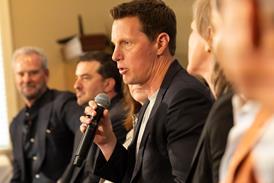Metrodome has been the sort of dependable arthouse distributor that has gone about its work quietly without much fanfare.
That's changing as the company has been increasingly in the headlines recently with positive announcements like the raising of $3.8m (£2m) in funding and acquiring higher-profile films such as Deepa Mehta's Water, Rachid Bouchareb's Days Of Glory (Indigenes) and Sarah Polley's Away From Her.
That's all part of the new company strategy launched by CEO Peter Urie, who joined Metrodome in late 2005 as managing director.
One of his first goals was to make Metrodome more independent from its previous parent TV-Loonland, the German family entertainment company. TV-Loonland is still involved with Metrodome, but instead of holding 83% of stock, it will soon have about 67%, and that figure is expected to drop below 50% by spring 2007.
Urie says his year of examining Metrodome's business and working on a restructuring plan has been beneficial. 'When I first joined the business I thought this company just had so much potential that hadn't been realised,' he says. 'And this first stage has proved to everyone, including our investors, that we really can grow this business quite successfully and really rapidly.'
Metrodome will continue to do 12-14 theatrical releases per year, but some of those will be slightly larger than past releases. 'We're now able to work with more obviously commercial films,' says general manager theatrical Sara Frain. 'It was great for us to be able to compete at that level in Toronto, bidding for Away From Her.'
That's not to say that Metrodome will abandon its arthouse roots - it recently continued its long-time relationship with Lukas Moodysson by releasing his challenging project Container with an installation at London's ICA.
The company's strategy shift will also look to co-produce or pre-buy projects for the first time in many years. 'My background is production and I'm keen to produce one to three films a year, that we will produce, co-produce or pre-buy,' Urie notes. 'We are just starting now to look at some films.'
The other major change at Metrodome is a fresh look at its home video business, launching two new labels for budget titles and releasing all titles in-house rather than subcontracting to other distributors as in the past.
'Home video has been a good, solid revenue generating business for us, yet we've always underinvested in. This new funding will be useful,' Urie notes. 'We do 75-80 titles per year, and I want to do at least double that next year. It allows us to use the profits from home video to reinvest in the theatrical business.'
The company is also actively involved in VOD, digital downloads and other new technologies, as way to exploit Metrodome's library of TKXXX films and its exclusive UK rights to TV Loonland's 1,300 titles.
In more support of new technology, all theatrical releases in 2007 planned to have a digital release of some size, starting with lauded French horror title Them in January, which will open digitally on 25 of its 45 screens.
Metrodome has tried to create a legacy of making the most of its marketing funds in the past and will continue to in the future ñ with Them, look for innovative online campaigns and unusual press stunts. 'We always try to do something a little bit different and stand out just that little bit more,' says Frain. 'It's not marketing by numbers.'
Jezz Vernon recently was promoted to Metrodome's head of marketing (after Tom Grievson joined Warner Bros.) and Revolver Entertainment veteran Vernon now oversees both theatrical and home video plans.
Through the restructuring, Metrodome has held steady with a staff of 25-30 based in its London office, which moves next week from Charlotte Street to Dean Street in Soho. But with the business looking healthy, Urie has his eyes on growth to potentially expand into Western Europe, Australia or Canada, by establishing Metrodome offices in key territories or partnering with or acquiring other companies.
He says: 'We can establish that we're a successful and profitable distribution business in the UK, so why not do it abroad as well''





















No comments yet